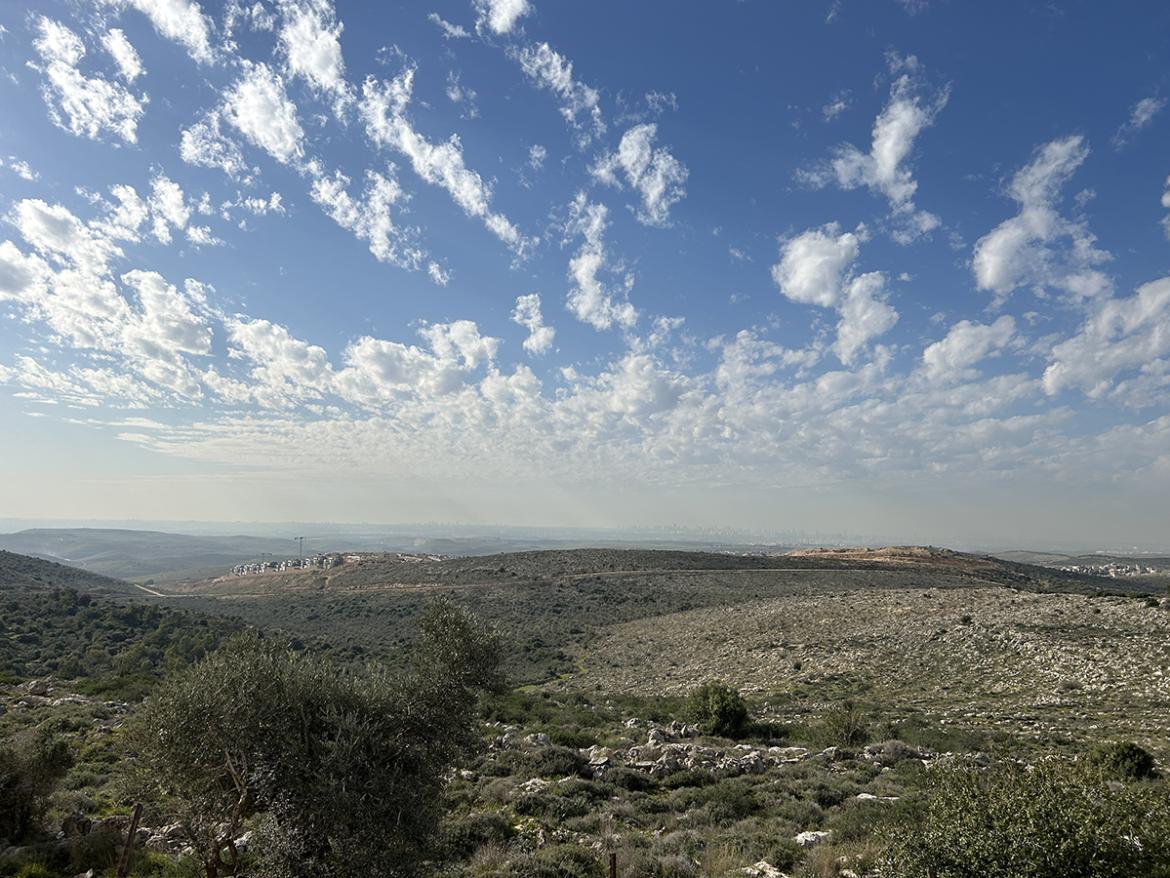As our plane descended into Tel Aviv on Jan. 11, a small rainbow arced over the Holy Land. I had come looking for signs of hope amid a time of devastating violence and suffering in Israel and occupied Palestinian territory. This small sign of God’s promise encouraged me for the work ahead.
I was in the Middle East with Hassan El-Tayyab, FCNL’s legislative director for Middle East policy, and eight other faith leaders as part of a peace delegation organized by Churches for Middle East Peace.
The trip was planned well before the Oct. 7 attacks by Hamas and Israel’s subsequent bombing campaign and the war in Gaza.
But once the Israel-Hamas war began in earnest, it became even more pressing to join faith colleagues in what became a peace mission. It was also an opportunity to listen to and learn from communities directly affected by the violence.
We traveled to Israel, the occupied territories, Jordan, and Lebanon, meeting with a wide range of religious, political, and civil society leaders. We spent two weeks crisscrossing checkpoints and border controls as the war raged and violence escalated around us.
We met with ambassadors, prime ministers, royalty, religious patriarchs, local faith leaders, human rights defenders, humanitarian aid workers, students, and peacebuilders.
At each stop, we shared our calls for a ceasefire, protecting civilians and returning hostages, and we pointed to the need to address the root causes of the violence, including the military occupation and blockade of Gaza.
As we traveled, tensions continued to spiral well beyond Gaza. At the Ramallah Friends School in the West Bank, we heard the nightly gunfire and military flyovers that have become standard since October. We heard firsthand accounts of weapons being distributed to settlers, extrajudicial killings, detentions, and torture. Before we arrived at our last planned stop in Irbil, Iraq, attacks near the U.S. Consulate killed civilians, causing us to cancel this part of our trip.
As children at the Ramallah Friends School asked: Why is the United States sending bombs to kill us?
The reality of the threats facing Palestinians, Israelis, the region, and the world became more evident each day. Gaza is the epicenter, but a broader war was unfolding all around us. As children at the Ramallah Friends School asked: Why is the United States sending bombs to kill us?
I am a Quaker and a peace advocate. We have a long history of seeking a just peace in the Middle East. But I am also an American citizen, and my government’s complicity in this war and mass killing is unavoidable. I learned so much from my recent trip, but this is what Congress, and the American people need to know.
The war is already rapidly expanding. De-escalation and diplomacy are needed across the region. As one political official explained it, “If the West Bank explodes, the war will enter a whole other level.”
This must be avoided. A comprehensive, permanent ceasefire is needed now. The only way to save both Gazans and the hostages, both Palestinians and Israelis, both the Holy Land and our common humanity, is with a ceasefire.
Focusing on diplomacy will be incredibly difficult in the aftermath of the attack on an American outpost in Jordan. But the United States must exercise restraint, choosing diplomacy over war. Humanitarian aid must be funded and allowed into Gaza.
The United States is complicit in this war and the atrocities against civilians, meaning we can also help stop them.
As it stands, the United States is complicit in this war and the atrocities against civilians, meaning we can also help stop them. The United States provides Israel with more than $3 billion annually in military aid, and the administration has sent additional weapons without congressional approval since Oct. 7.
These numbers are not trivial, nor are the lives they are costing. Our government must be held accountable and do more to help prevent atrocities and potential genocide.
A viable, irreversible path to justice, dignity, and peace for both Palestinians and Israelis is needed. It will take new approaches to leadership on both sides. But there are people now working in good faith, and their vision for a just and peaceful future together must be given space. The United States and the broader international community must hold the rights of both Palestinians and Israelis equally and support future arrangements that recognize the self-determination of all.
Throughout our trip, we sought to listen deeply, share openly, and speak courageously. People across the region welcomed us with grace, hospitality, and solidarity. We learned more than we could absorb and received gifts of the spirit with every interaction.
We left strengthened to return to our work of advocacy and truth-telling at home, knowing that as Americans we have a responsibility and a role to play in ending this violence and seeking a lasting peace in the Middle East.
Originally published by Religion News Service. Bridget Moix and Hassan El-Tayyab also wrote “Six Lessons from Our Wartime Journey to Israel-Palestine,” published by Inkstick Media.




